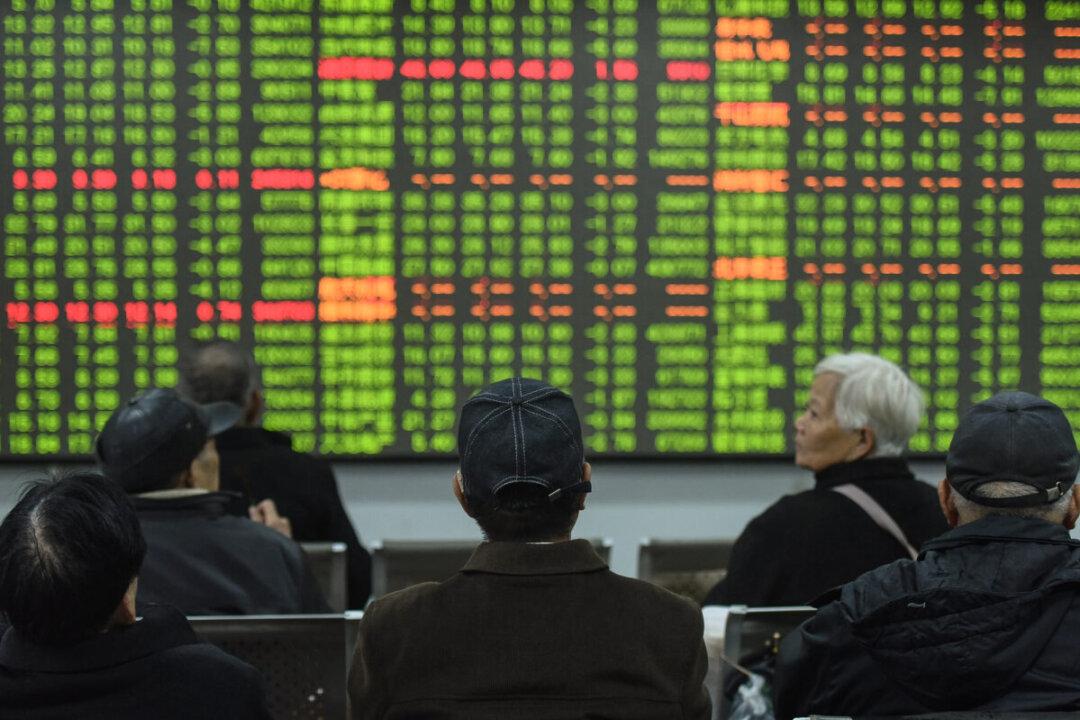Commentary
China’s stock market is now closer to a laughingstock. Its initial public offerings are weak.
While Chinese equities, including in Hong Kong, lost $6.3 trillion in market capitalization since February 2021, U.S. markets gained $5.3 trillion. U.S. and Chinese equity indexes were previously highly correlated, starting as early as 2004.
Beijing finally noticed and apparently thinks that up to $488 billion of mostly offshore regime holdings, some of which would be converted into yuan and used to buy Chinese stocks, will prop up its equities market. The regime also intervened in currency markets to boost the yuan, which is under pressure from falling stocks. News of the interventions saw a short-term uptick in Chinese equities but otherwise fell flat.
Media coverage was withering. “It looks like Beijing might need a bigger bazooka,” noted Bloomberg. “Using cyclically adjusted price/earnings multiples, Barclays data show that Chinese stocks for several years traded exactly in line with the US—a fact that with hindsight suggests remarkable overconfidence in China’s corporate governance and in the intentions of the ruling Communist Party.”
The Wall Street Journal compared Xi Jinping with King Canute “The Great”—vainly commanding the tide to go out.
CNN noted that China’s economy is “plagued by a myriad of problems,” including “a record downturn in real estate, deflation, debt, a falling birthrate and shrinking work force, as well as a shift towards ideology-driven policies that has rattled the private sector and scared away foreign firms.”
One “fundamental” previously ignored by investors is the Chinese Communist Party’s (CCP) illiberal controls on capitalist earnings. Communism and capitalism are fundamentally opposed, which is finally being realized by markets, as evidenced by 60 percent cheaper Chinese compared to U.S. stocks based on earnings.
Mainland China pays this price for its command economy and aggressive foreign policy, which are arguably the key factors forcing down Chinese stocks. Hong Kong markets, previously seen as beyond the reach of the CCP, are now falling even faster.
Alternatives for Chinese investors are foreign-focused funds, especially those linked to the United States, Japan, and India. India’s equity market capitalization beat China’s for the first time in January.
But after skyrocketing in price, U.S. and Japan exchange-traded funds (ETFs) in China are under pressure from the CCP. They were “irrationally” high in late January, trading at an over 15 percent premium to the underlying value of their equities. Chinese regulators halted trading in a Japanese fund when it reached a 20 percent premium and warned investors. Afterward, the fund fell to a still substantial 5 percent premium.
Another closing window of opportunity is through bitcoin and other cryptocurrencies, banned on the mainland in 2021. Crypto has the advantage for Chinese investors, who still trade it privately through gray-market dealers in Hong Kong, overseas bank accounts, and international exchanges, of potentially evading Beijing’s capital controls.
Chinese citizens are allowed to move as much as $50,000 per year into foreign exchange for educational or travel purposes. They often use this quota in foreign investing instead of for its approved uses. On the mainland, Chinese investors use WeChat or Alipay to convert yuan into stablecoins and then to crypto on exchanges like Binance or OKX.
Banned peer-to-peer crypto trade in China is now at over $85 billion annually, with an additional $64 billion traded in Hong Kong. That puts China at 13th place in the 2023 global crypto rankings, compared to 144th in 2022.
However, crypto is an inherently risky asset, given it has no ultimate use value other than perhaps its unique ability for “untraceable” illegal transactions by criminals and terrorists. Even this, however, is now under question as it can reportedly be traced with the right law enforcement technology. Conversely, other assets have ultimate use values. Gold can be used as jewelry, and regular fiat currencies are legal tender, including to pay taxes, for example. An ultimate use value helps buoy the exchange value of an asset by regularly removing quantities of it from circulation. New crypto coins, on the other hand, regularly increase the quantity of crypto on the markets.
Despite crypto’s problems, Chinese citizens are buying because the CCP’s response to falling Chinese equities is tone-deaf to its own failed policies of the bygone era of command economies, including capital controls and pressure on private market actors to invest in Chinese assets. These anti-market interventions are exactly what will spook markets further.





